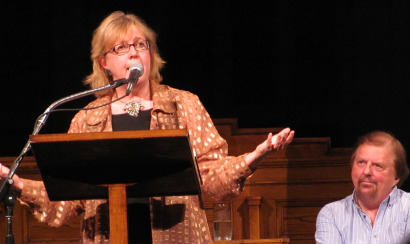By Haley Cullingham
Last night, we sat in on a talk by Elizabeth May, leader of the Green Party, and author and journalist Gwynne Dyer. Dyer opened the talks with frank and alarming discussion of the possible implications of climate refugees, water shortage, and drought on world peace, and May followed up with an inspiring speech about where hope can be found in the grim scientific situation. We spoke with May after the event about why her lack of co-ordination led her to activism, and what we as young women can do to contribute to the fight for climate justice.
“We are in the time when there is time to do everything,” May reminded the audience assembled at Trinity-St. Paul’s Church, citing global scenarios of the past, like apartheid, where until the 11th hour, hope seemed irrational. May remembers joining the Green Movement 40 years ago, in tenth grade, on the first Earth Day. “Some people are dancers, some people are environmentalists,” May says.
“If we fail to act on the climate crisis, nothing else we do, no matter how valuable, is going to survive,” May tells me. In this way, Climate Change is really everyone’s cause-anything you care about, anything that inspires you to be passionate, is effected by this global crisis. “It’s kind of like saying we have a problem with water, and there’s a problem if you have to live waist deep in water, but there’s a bigger problem if you have to live with your head underwater. Climate Change has different levels of impact, and the more we postpone action, the greater the likelihood that what happens will be so catastrophic we can’t recover.”
“We need to have leadership at the federal level, and what we have is an obstacle to progress,” May says. “The Canadian government is acting as a saboteur in negotiations, and this isn’t always communicated to Canadians, how much we’re in the way. I’d like to see Stephen Harper retired. He’s rolling us backwards, in a really dangerous way. If you can’t agree with us, at least get out of the way.”
The metaphorical water is already rising. Using some serious Jurassic Park-style science involving air pockets in ice cores, scientists can determine that the atmosphere now has 30% more carbon dioxide than at any time in the last million years. May is quick to point out that humanity has occurred because of a beneficial climate, and whether it’s the wars Dyer warns about, the product of pressures due to food shortages, environmental refugees escaping drought, and water supplies dying up, or catastrophic climate events inspired by what May calls “tipping points” in the atmosphere, we’re quickly moving towards decimating that beneficial climate. “We’ve got time to take action,” May says, “but the amount of time that’s available to us is limited.”
But even in the face of daunting odds, May and Dyer both find hope in the fact that this time of relative global peace puts us in a position to come together at the table and talk. Dyer fears that that time, too, is limited. May talks about the heroism of the small countries in Copenhagen, standing up to China and the U.S., demanding the action on which their survival depends. During the talk, she recounted one of the slogans chanted by African protesters at Copenhagen, in reference to degrees of global temperature increase. “1.5 to stay alive. 2 degrees is genocide. 3 degrees is suicide.”
Let’s all stand up and act, before it goes that far.



 Follow Us On Instagram
Follow Us On Instagram
